Health problems during monsoons/ rainy season - Symptoms, Prevention and Treatments
During the monsoons or rainy season, health problems such as skin diseases, water borne diseases, mosquito-borne disease and eye infections are very common. Read this article to know what are the health diseases that are common during monsoons. The articles also gives the symptoms, remedies and prevention of the diseases.
General ailments during monsoons
1. Indigestion
Symptoms of indigestion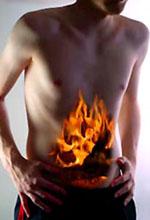 - Discomfort in abdomen, feeling of fullness, bloating (swelling of abdomen), nausea, reflux (when stomach acid rises up the wrong way back up the food pipe), heartburn (pain in food pipe or chest when stomach acid is refluxed up into the throat), belching, constipation or frequent passage of stool.
- Discomfort in abdomen, feeling of fullness, bloating (swelling of abdomen), nausea, reflux (when stomach acid rises up the wrong way back up the food pipe), heartburn (pain in food pipe or chest when stomach acid is refluxed up into the throat), belching, constipation or frequent passage of stool.
Common causes of indigestion - Eating too fast or overeating. Drinking carbonated beverages, eating high fibre, spicy or fatty foods. Too much caffeine, alcohol, smoking, anxiety and depression. In serious cases, indigestion may also be triggered by gastric problems such as ulcers, gastritis, gall bladder stones or stomach cancer. Non-steroidal anti-inflammatory drugs (NSAIDs) such as aspirin or ibuprofen and antibiotics taken on an empty stomach also causes stomach upsets.
Remedies for indigestion - Eat small portions of diluted ginger and lime juice, ajwain or rock salt. Drugs like Digens, gelusil and pudinhara will also help.
Caution - While consulting the doctor, be specific about your symptoms (frequency and pattern). Sudden, severe abdominal pains, vomiting blood or passing blood in stool or contracting jaundice calls for medical help. If symptoms include jaw pain, chest pain, back pain and profuse sweating (possible symptoms of a heart attack), treat it as an emergency.2. Food poisoning
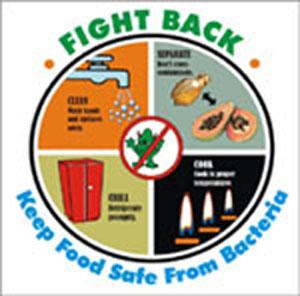 Causes of food poisoning - Eating contaminated food (with toxins or bacteria like E-coli, staphylocous or salmonella).
Causes of food poisoning - Eating contaminated food (with toxins or bacteria like E-coli, staphylocous or salmonella).
Symptoms of food poisoning - Nausea, vomiting, abdominal pain, diarrhoea, fever and chills, headache and weakness. Generally occurs 2-6 hours after eating contaminated food. Most recover within 12-48 hours.
Remedies for food poisoning - Diarrhoea is body's natural cure (a way of getting rid of the toxins) and doesn't need medications. But, dehydration should be guarded against. Take plenty of fluids like water, lemon juice with salt and sugar, thin buttermilk, arayat kanji or rice water. Control nausea and vomiting with drugs like Domstal or Perinorm.
Prevention of food poisoning - Carefully wash your hands and clean dishes before handling food.
Caution - Avoid solid foods when suffering from food poisoning. Antibiotics can be avoided as they might be harmful. Drugs like Lomotil should be avoided as they reduce frequency of stool and could result in more serious complications.3. Athlete's foot
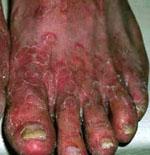 The fungal infection that causes athlete's foot loves warm, damp places. Sweaty shoes and trainers are the ideal place for the fungus to breed. It usually starts with a flaky, red rash which then blisters or cracks and can become very sore. It is also contagious. Athlete's foot is a painful fungal infection, generally caused by ill fitting and damp shoes. Itching, skin scales, cracks and inflammation are the usual symptoms. Hot, humid weather helps to breed the infection causing fungi and bacteria. It is usually transmitted in the swimming pool.
The fungal infection that causes athlete's foot loves warm, damp places. Sweaty shoes and trainers are the ideal place for the fungus to breed. It usually starts with a flaky, red rash which then blisters or cracks and can become very sore. It is also contagious. Athlete's foot is a painful fungal infection, generally caused by ill fitting and damp shoes. Itching, skin scales, cracks and inflammation are the usual symptoms. Hot, humid weather helps to breed the infection causing fungi and bacteria. It is usually transmitted in the swimming pool.
Remedies for athlete's foot - Put creams like Daskil or Zimig that can clear the infection within a week. Avoid re-infection. Dry shoes for 24 hours or use a hairdryer before wearing them again and store them in a cool and dry place. Wear washed, cotton socks and keep feet clean and dry. Wear shoes that allow ventilation. Follow an end-of-the-day hygiene routine that includes lathering feet with soap, scrubbing them with pumice stone, rinsing thoroughly with cold water, pat them dry and apply a light moisturiser.
Ayurvedic remedies for athlete's foot - After swimming, wipe water and apply Eladi oil all over the body and keep for 30 minutes. To remove, apply Eladi choornam with water (as a body scrub) and wash it off with warm water.
Naturopathy remedies for athlete's foot - After swimming, take warm foot bath for 15-20 minutes with salt or neem leaves added to it.
Homeopathy remedies for athlete's foot - Graphite can treat Athlete's foot. Rhus tox, Ars alb, Sanicula, Sepia, Tellurium can be taken (3 pills 4 hourly for 3 days). Calendula ointment or powder can relieve itching.4. Asthma
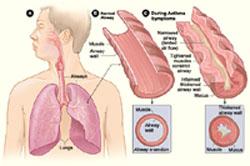 Ayurvedic remedies for asthma - Herbal oil massages followed by warm water bath. Have warm meals. Include soups, rotis, fish, nuts and soya in diet.
Ayurvedic remedies for asthma - Herbal oil massages followed by warm water bath. Have warm meals. Include soups, rotis, fish, nuts and soya in diet.
Naturopathy remedies for asthma - Steam inhalation with tulsi leaves prevents cold and nasal congestions. Boil 1 cup water with pepper, ginger, garlic and jeera, cool it a little and drink it daily.
Homeopathy remedies for asthma - Allium Cepa is prescribed for watery discharge and sneezing. Gelsemium is prescribed for low-grade fever, muscle aches and lethargy. Acontinum is good for treating cold, flu, sore throat, cough and earaches.5. Cold and cough
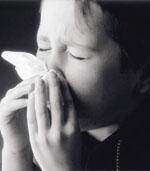 - Common cold is a manifestation of a viral infection. While the mucous membranes of the nose and throat are inflamed as a result of infection, they are more vulnerable to bacterial attacks which lead to more serious infections such as sinusitis, ear infections and bronchitis.
- Common cold is a manifestation of a viral infection. While the mucous membranes of the nose and throat are inflamed as a result of infection, they are more vulnerable to bacterial attacks which lead to more serious infections such as sinusitis, ear infections and bronchitis.
Prevention of cold
a. Include garlic, onions and vitamin-C rich foods such as citrus fruits, guava, tomato and spinach in your diet.
b. Dairy products and wheat can increase phlegm production, so avoid them when you have a cold.
c. Blow your nose regularly - press a finger over one nostril and blow gently to clear the other.
d. Keep yourself warm and rest in initial stage of cold to build immunity.
e. Eat hot soups and herbal tea to relieve congestion, prevent dehydration and soothe the inflamed membranes of nose and throat. Take hot showers to clear congestion and relax.
f. Grind 50g dried amla, 50g black cumin seeds and 21seeds of black pepper. Take 5g of this powder with honey and drink a glass of warm water immediately after. This powder is good for asthma also.
Ayurvedic remedies for cold and cough - After washing your hair, massage a pinch of Rasnadi Choornam (a herbal powder) on the crown of the head. This prevents colds and rhinitis (irritation and inflammation of the inner linings of the nose). Take Thaleesa Patradi Choornam - ¼ tsp every one hour.
Naturopathy remedies for cold and cough - Boil 4 glasses of water with a handful of tulsi leaves and 1 tsp of pepper. Boil till the quantity is halved. Strain, add 2 tsps honey and drink. Take steam inhalation with tulsi leaves or eucalyptus leaves/oil in water to relieve chest congestion.
Homeopathy remedies for cold and cough - To relieve watery eyes, sneezing and tickling cough, take Allium Cepa. Take Arsenicum Album to cure burning and runny nose and allergy attacks. Take Gelsimium if you feel tired during allergies and have a flushed and bloated face. Natrum muriaticum is for allergy attacks with sneezing, watery eyes, clear nasal discharge and a loss of taste and smell.6. Arthritis
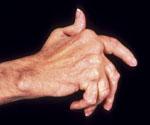 There are two types of arthritis namely osteoarthritis and rheumatoid arthritis.
There are two types of arthritis namely osteoarthritis and rheumatoid arthritis.
Treatment for arthritis - A warm, stable climate, exercise and detoxification helps. Avoid dairy products, wheat, meat, vegetables such as potatoes, pepper, eggplant and tomatoes, alcohol, coffee, sugar, saturated fat, excess salt and nuts.
Epsom salt baths are recommended to reduce swelling and alleviate pain. Local mud applications on the joints is also advised.
Mix 2tbsp honey and 1 tsp cinnamon powder in one cup of hot water. Drink this regularly.7. Viral fever
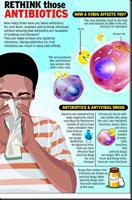 - Viral fever can affect any age group. It usually requires only symptomatic treatment. The duration of primary infection may vary from few days to several weeks. Some variants can be highly contagious, but most are not dangerous. Most viral infections spread via inhalation of aerosolised particles on direct contact or intake of contaminated water or food. If fever lasts over 5 days, consult a doctor immediately.
- Viral fever can affect any age group. It usually requires only symptomatic treatment. The duration of primary infection may vary from few days to several weeks. Some variants can be highly contagious, but most are not dangerous. Most viral infections spread via inhalation of aerosolised particles on direct contact or intake of contaminated water or food. If fever lasts over 5 days, consult a doctor immediately.
Symptoms of viral fever - Rising body temperature, head and body ache and occasionally a skin rash. Once the virus enters the body, there is an incubation period while it multiplies to a level high enough to cause an infection. A phase of fatigue follows when the body and muscles ache, and could lead to a low or high-grade fever. Inflammation of the pharynx, a runny nose, nasal congestion, redness of eyes, cough, and muscle and joint pains can also be present.8. Normal fever and throat pain
Steps to prevent throat pain
a. Gargle 3 times a day with hot water and salt.
b. Don't drink or eat cold stuffs.
c. Do steaming regularly.
d. Don't sit near a person who is smoking.
Steps to prevent fever
a. Don't drink cold water immediately after being out in the sun.
b. Put oil on inside of legs. Avoid bathing at night.
c. Keep oil in hair. It is good for the eyes.
d. Bathe only after body stops sweating.Skin diseases that are common during monsoons
1. Eczema
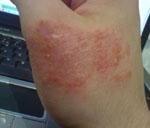 Eczema is a skin disease. It is a form of dermatitis which is broadly applied to a range of conditions. In its mildest form, it causes the skin to become dry and flaky, and at its worst, it causes cracks and bleeding. Atopic eczema has hereditary components and can be passed on through family members who have eczema. Contact eczema is caused by allergic reaction to daily objects that your skin comes into contact with, or becomes irritable as a direct reaction to a solvent. Reasons of eczema are heat, dampness and wind. Avoid spicy foods, caffeine, alcohol, greasy and fried foods. Eat fruits and veggies which are neutral or cold in nature. Meditation helps to reduce inner heat. Eczema is a chronically recurring itchy inflammation of skin, starting in early childhood, also known as atopic dermatitis. Symptoms of eczema include inflammation, itchiness, dryness and bacterial infections of skin. Commonly affected areas are elbows, behind knees, side of the neck and on cheeks. It can be caused due to weather, food, allergy, skin irritants and stress. Reduce fish, peanuts, eggs, soy, salty and sour items such as pickles and curd. Eczema is quite common during the monsoons or rainy season due to the increased humidity and frequent temperature changes during this season.
Eczema is a skin disease. It is a form of dermatitis which is broadly applied to a range of conditions. In its mildest form, it causes the skin to become dry and flaky, and at its worst, it causes cracks and bleeding. Atopic eczema has hereditary components and can be passed on through family members who have eczema. Contact eczema is caused by allergic reaction to daily objects that your skin comes into contact with, or becomes irritable as a direct reaction to a solvent. Reasons of eczema are heat, dampness and wind. Avoid spicy foods, caffeine, alcohol, greasy and fried foods. Eat fruits and veggies which are neutral or cold in nature. Meditation helps to reduce inner heat. Eczema is a chronically recurring itchy inflammation of skin, starting in early childhood, also known as atopic dermatitis. Symptoms of eczema include inflammation, itchiness, dryness and bacterial infections of skin. Commonly affected areas are elbows, behind knees, side of the neck and on cheeks. It can be caused due to weather, food, allergy, skin irritants and stress. Reduce fish, peanuts, eggs, soy, salty and sour items such as pickles and curd. Eczema is quite common during the monsoons or rainy season due to the increased humidity and frequent temperature changes during this season.
Steps to prevent or reduce eczema
a. Bath in lukewarm water and don't stay in the water for too long in order to reduce skin irritation. Do not use harsh soaps or it is even better to use soap-free cleansers on the body which are mild and will still remove all the dirt and bacteria from your body. It is better to stay away from bubble baths.
b. People who are prone to eczema should always use a good moisturiser so that the moisture in the skin is always retained. Moisturisers work best when used immediately after a bath.
c. Avoid stress or at least try to reduce your stress levels as even stress can increase itching in the skin.
d. Wear cotton clothes and stay away from harsh perfumes, synthetic clothes and woollen clothes.
e. Nutritional hazards to eczema include peanuts, milk, egg, soybeans, sea food, pickles and curd.
Treatments for eczema includes acupuncture point Qu chi, moisturisers, antihistamines, oral steroids, antibiotics, Chinese herbal therapy, evening primrose oil, mixture of herbs such as neem (which is a powerful blood purifier, detoxifier and immunity enhancer), turmeric, saariva (hemidesmus indicus) and manjishtha (rubia cordifolia). Herbal remedies normalise the skin and blood tissues, optimising the immune system.2. Scabies
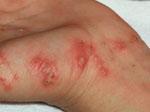 Scabies is also known as seven-year itch. It is a skin infection that is caused by a tiny parasite called the mite Sarcoptes scabiei. This skin infection is contagious. The patient will have severe itching and allergic reactions after the mite has bitten into the skin. Most important way of transmission of this infection is direct skin contact.
Scabies is also known as seven-year itch. It is a skin infection that is caused by a tiny parasite called the mite Sarcoptes scabiei. This skin infection is contagious. The patient will have severe itching and allergic reactions after the mite has bitten into the skin. Most important way of transmission of this infection is direct skin contact.
Symptoms of Scabies - Itching, burrow tracks on the skin, rashes.Water borne diseases during monsoons
1. Cholera
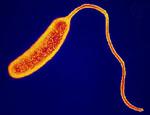 Flies, cockroaches and mice spread cholera like wild fire. The bacteria survives tenaciously for two weeks in water and 4 to 6 weeks in ice. Boil and filter water, wash hands frequently. Soak raw vegetables and fruits in potassium permanganate. Pest proof your home from cockroaches, flies and mice. Consider a vaccination during an outbreak. Its effect lasts for 3 to 6 months.
Flies, cockroaches and mice spread cholera like wild fire. The bacteria survives tenaciously for two weeks in water and 4 to 6 weeks in ice. Boil and filter water, wash hands frequently. Soak raw vegetables and fruits in potassium permanganate. Pest proof your home from cockroaches, flies and mice. Consider a vaccination during an outbreak. Its effect lasts for 3 to 6 months.
Symptoms of cholera include copious painless rice-water like stools, severe vomiting, dry wrinkled skin, plummeting BP and urine output, imperceptible pulse, intense thirst and stomach cramps.
Treatment for cholera - Get diagnosed via a doctor's examination and stool culture. Take enough bed rest. Drink plenty of fluids especially orange juice and oral rehydration therapy or packaged Electral. Eat pre-cooked cereal with salt. The doctor may put you on an intravenous fluid drip and prescribe antibiotics.2. Dysentery
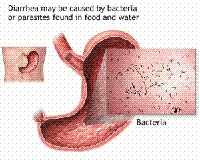 The responsible amoeba/bacillus thrives in contaminated food and water via flies and cockroaches. Boil and filter water. Watch out for green garnishes. De-vein prawns properly. Zap away flies and cockroaches at home. Keep liquid soap near the kitchen sink for hand washing. Wash all fruits and vegetables with dilute solution of potassium permanganate. Stay away from outside fruit and vegetable salads.
The responsible amoeba/bacillus thrives in contaminated food and water via flies and cockroaches. Boil and filter water. Watch out for green garnishes. De-vein prawns properly. Zap away flies and cockroaches at home. Keep liquid soap near the kitchen sink for hand washing. Wash all fruits and vegetables with dilute solution of potassium permanganate. Stay away from outside fruit and vegetable salads.
Symptoms of dysentery - Passing small foul smelling blood-stained mucous stools, may run a temperature and vomit, tenderness or swelling in abdomen.
Treatment for dysentery - Get diagnosed by a stool test to find out the responsible amoeba or bacillus. Try ORT or Electral. Drink plenty of fluids. Eat semi-fluid and low roughage food.3. Typhoid
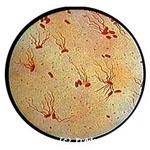 The tough bacilli that causes typhoid survives up to 7 days in water and over a month in ice. It is spread through flies and cockroaches. Boil milk and water. Wash raw fruits and vegetables in potassium permanganate water. Wash hands frequently. Protect food from flies with a fly swatter. Test that your domestic help are not carriers of typhoid disease. Zap cockroaches. Get vaccinated - oral or injectable. The immunity lasts for a year.
The tough bacilli that causes typhoid survives up to 7 days in water and over a month in ice. It is spread through flies and cockroaches. Boil milk and water. Wash raw fruits and vegetables in potassium permanganate water. Wash hands frequently. Protect food from flies with a fly swatter. Test that your domestic help are not carriers of typhoid disease. Zap cockroaches. Get vaccinated - oral or injectable. The immunity lasts for a year.
Symptoms of typhoid - Splitting head and rising fever, although pulse remains steady. Tongue is thickly coated, crops of red rashes invades the chest and stomach, shivering, sweating and coughing. Constipation follows diarrhoea.
Treatment for typhoid - Get diagnosed by a blood test and stool test. Take enough bed rest. Drink plenty of fluids, juices and soups. Cold water sponges brings down the fever. After few days on semi-fluids, go for a low roughage diet. Don't take aspirin and paracetamol as they may irritate the bowel lining and stomach.4. Hepatitis A
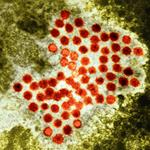 Hepatitis is the Latin word for liver inflammation. It means inflammation or swelling of the liver. The inflammation may cause jaundice. So, often the terms hepatitis and jaundice are used interchangeably. Hepatitis A is a viral infection caused by the Hepatitis A virus. There are other viruses - B,C,D and E - which can be diagnosed, but only Hepatitis A and B can be prevented with a vaccine. Hepatitis A is self-limiting and lasts for 3 weeks. It is caused by contaminated food and water and is very common during the monsoons. A diet of glucose, peeled fruits, home-made fruit juice, soup, toast, rice and buttermilk is recommended. Anti-vomiting medicines such as Rantac or Pantocid may be prescribed. There is no specific treatment to cure hepatitis. Hepatitis B spreads via blood and blood transfusion, infected injection needles or infected surgical instruments and sexual contact. A blood test called the Australian antigen test is taken to detect Hepatitis B antibodies. Those with Hepatitis B may eventually develop severe jaundice, liver cirrhosis or even cancer of the liver. Effective treatment for Hepatitis B is still not available. It is advisable to take preventive measures such as combined vaccine of Hepatitis A and B. If hepatitis lasts longer than 6 months, it is called chronic hepatitis.
Hepatitis is the Latin word for liver inflammation. It means inflammation or swelling of the liver. The inflammation may cause jaundice. So, often the terms hepatitis and jaundice are used interchangeably. Hepatitis A is a viral infection caused by the Hepatitis A virus. There are other viruses - B,C,D and E - which can be diagnosed, but only Hepatitis A and B can be prevented with a vaccine. Hepatitis A is self-limiting and lasts for 3 weeks. It is caused by contaminated food and water and is very common during the monsoons. A diet of glucose, peeled fruits, home-made fruit juice, soup, toast, rice and buttermilk is recommended. Anti-vomiting medicines such as Rantac or Pantocid may be prescribed. There is no specific treatment to cure hepatitis. Hepatitis B spreads via blood and blood transfusion, infected injection needles or infected surgical instruments and sexual contact. A blood test called the Australian antigen test is taken to detect Hepatitis B antibodies. Those with Hepatitis B may eventually develop severe jaundice, liver cirrhosis or even cancer of the liver. Effective treatment for Hepatitis B is still not available. It is advisable to take preventive measures such as combined vaccine of Hepatitis A and B. If hepatitis lasts longer than 6 months, it is called chronic hepatitis.
Hepatitis A spreads through faecal-oral contact, infected food and water, consuming food made by someone who touched infected faeces, drinking contaminated water and blood-borne infection. Hepatitis B and Hepatitis C are transmitted via blood transfusion, intravenous drug use, tattooing, acupuncture with contaminated needles and sexual transmission. Hepatitis D occurs the same way as Hepatitis B except that the transmission from mother to baby is less common.
Treatments for Hepatitis
a. Acupuncture helps in strengthening liver condition.
b. Naturopathy remedies - Apply gastro-hepatic, castor oil and mid packs on right side of abdomen. Hip-bath with cold water for 20 minutes daily. Liquid or fruit diets. Have plenty of soups, sugarcane juice, coconut water and fat free buttermilk.
c. Ayurvedic remedies - Low fat, high carbohydrate diet, jeera water, sugarcane juice and external application of herbal preparations.
d. Homeopathy remedies - Boosts immune system with medicines like Cardus, Bryonia, Chelidonium and Lycopodium.
Symptoms of Hepatitis - Tiredness, joint pains, pain below right ribs, jaundice, amenorrhoea (absence of periods) in women, liver and spleen enlargement, ascitis-fluid in abdomen and hepatic encephalopathy.
Detection of Hepatitis - Blood tests are carried out to detect the presence of antibodies. Elevation of 1gM antibody count in absence of 1gG shows acute hepatitis. Increase in 1gG and not 1gM shows chronic or convalescent state. Mosquito-borne diseases during monsoons
1. Dengue
Dengue is a mosquito-borne disease. The mosquito that carries the virus causing dengue fever breeds in stagnant waters. It is dangerous even if the water is clean. Get the disease confirmed with a blood platelet count and blood antibody test. As soon as it is diagnosed, get medical aid as soon as possible. Do not take aspirin as it can lead to acidity or bleeding. The doctor may put you on an intravenous drip, give a blood transfusion, treat symptoms of fever and body ache or prescribe mild sedatives. It can cause profuse bleeding and respiratory problems. Bleeding occurs when blood platelet count falls too low which hinders an essential function called clotting. If the platelet counts reduces all of a sudden, it can result in dengue haemorrhagic fever which can ultimately lead to death. The immune system becomes very weak during this disease which causes respiratory infections. As the immune system is weakened, it is easier for bacteria to attack the body. The most crucial period is the first 8-10 days. After this period, the virus usually burns itself out of the body. There is no cure or vaccine for dengue. The right medication and medical attention should be administered. Do not take aspirin, dispirin and brufen tablets as these may increase bleeding in stomach. Wearing mosquito repellent creams and full-sleeve clothes can keep the mosquitoes at bay.
Symptoms of dengue fever - high fever, rash, pain behind reddish eyes, muscle and joint pains, nausea and a bitter taste in mouth, severe headache, backache, vomitting.2. Malaria
Malaria is transmitted by the female mosquito known as Anopheles mosquito. The male mosquito is only a vegetarian and thus it is caused only by the female one who loves to feed on human blood. It occurs mainly because of stagnant water, both clean water as well as dirty water. The transmission takes place mainly between dusk to dawn. So, people have to be extra careful during this time by preventing themselves from getting bitten. If this disease is not treated at the right time in the correct way, it can turn out to be fatal. The best way to prevent malaria is to stop accumulating water in drums, cans, buckets, tubs and flowerpots. If you have to do these things, keep changing the water frequently. Also make sure that you always clean fish tanks, vases and air coolers daily.
Prevention of malaria
1. Clean underground and overhead tanks monthly with organophosphorus insecticide (ABATE) as it is the favourite breeding place for mosquitoes. The insecticide is harmless to humans.
2. Always cover the overhead tanks, wells and air coolers.
3. Use mosquito nets while sleeping.
4. Dont accumulate stagnant water in any form in and around your house.
5. Make sure that your municipal ward fogs your compound at intervals and also cleans gutters and drains from time to time. Check that your swimming pool is chlorinated.
6. Fix mesh screen on doors, windows and open balconies. Mosquitoes are more attracted to dark colours and surfaces. So it is better to wear white clothes and also paint your home walls white or any light colour.
7. Use mosquito repellent creams, liquids, coils, sprays and electronic devices.
8. When you venture outside the house in the evenings, wear long sleeves and trousers. The most affected parts of the body are the arms, legs and feet.
Symptoms of malaria - high fever teamed with shivering, sweats, headaches and joint pains that disappear and reappear at fixed, say 24 hour intervals, with clockwork regularity. Continuous fever with headaches, runny nose, body aches, abdominal pains, vomiting and diarrhoea.
Treatment for malaria - Firstly, get the malaria identified to find out responsible parasite by a blood test or blood smear. As soon as it is diagnosed, get yourself treated. Classic malaria needs chloroquine and prinaquine whereas malignant malaria needs quinine. Both the classic malaria and malignant malaria responds to mefloquine. Self-medication is extremely dangerous, so do not try it. Do not stop the course of medication without the doctor's approval as it can lead to unpleasant side effects. Don't overdose the medication in the hope that you could get well sooner.3. Chikungunya
Chikungunya is another mosquito-borne disease transmitted by a virus that is spread by the Aedes mosquito. Its symptoms are similar to those of dengue fever. The duration for this disease is usually two to five days at the mild stage.
Symptoms of Chikungunya - High fever, rashes and arthritis that affects the joints. Arthiritis becomes very severe in elderly people who sometimes face the symptoms for more than 2 years. Some other symptoms include headache, conjunctivitis and photophobia. Eye infections during monsoons
1. Conjunctivitis
Conjunctivitis is a condition where the conjunctiva (a membrane that acts as a lining for the eyelids and also covers the part of the eyeball which is exposed) is subjected to inflammation. This eye infection is quite common in the monsoon season and it is a contagious infection. The main symptom of conjunctivitis is redness and watery eyes. Sometimes, one can experience pain and discharge which usually starts with one eye and spreads to the other eye gradually. One may experience a fever before the onset of conjunctivitis.
Symptoms of conjunctivitis - redness and watery eyes, gritty feeling in the eye, blood clots visible around the cornea. In the case where conjunctivitis moves on to the cornea of the eyes, the patient can experience some more severe symptoms such as pain, glare, intolerance to light and sighting coloured halos near lights.
Prevention of conjunctivitis from spreading
a. Wash your hands frequently. The patient should not bathe in public water so that the other members of the family are not inflicted by the ailment.
b. It is better that the patient stays isolated from other people during this time. Too much contact with them can make them get conjunctivitis too. Never share towels, bed sheets, handkerchiefs etc.
c. The patient with conjunctivitis should not touch his/her face with their hands. Wash your hands very well with soap and cleanser every day when you come back home from outside.
Treatment for conjunctivitis
a. Use antibiotic eye drops which the doctor has prescribed and keep lubricating the eyes with these drops.
b. Consult an ophthalmologist to examine the eyes and give proper medications. You should never avoid a visit to the doctor when you have conjunctivitis, as it may lead to serious complications.2. Corneal Ulcers
Corneal Ulcer is a bacterial infection occuring at the cornea of the eye. The chances of its occurrence increases during the monsoons.
Symptoms of Corneal Ulcers - redness and watery eyes, photophobia in one eye, pain.
Treatment of Corneal Ulcers - This is a serious infection of the eyes and so it is compulsory that a person affected with this infection must visit the ophthalmologist as soon as possible. Stop wearing contact lens as soon as you contract the infection. Corneal Ulcers are treated using antibiotics depending on its severity.
